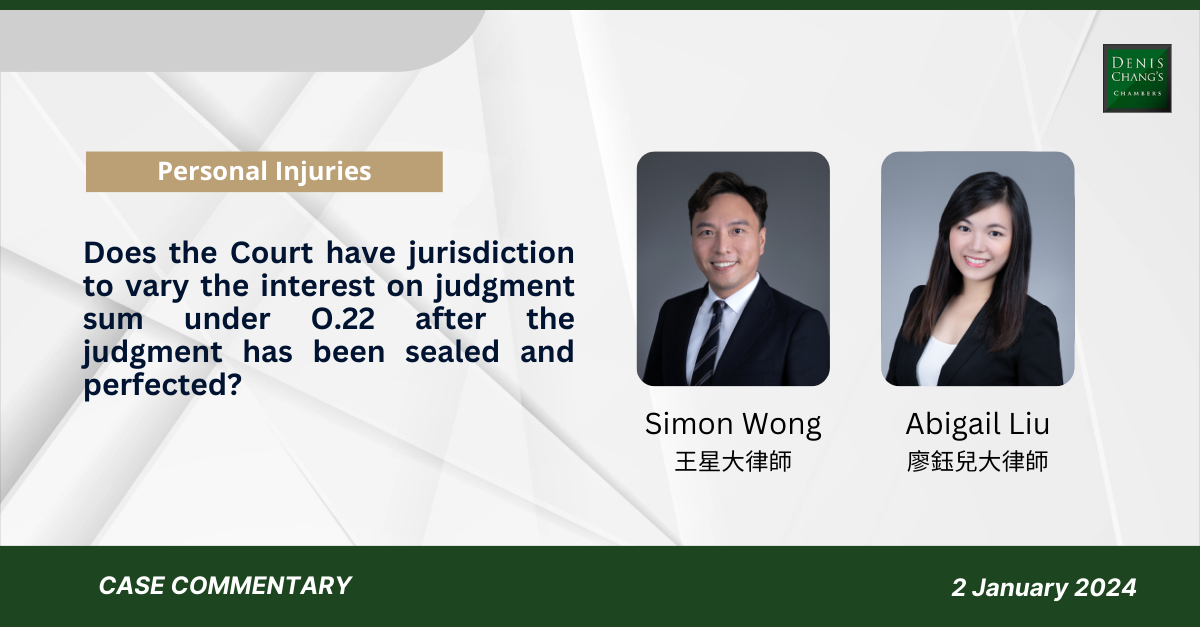
Does the Court have jurisdiction to vary the interest on judgment sum under O.22 after the judgment has been sealed and perfected?
Personal Injuries
Two personal injury cases recently decided by the Court of First Instance of Hong Kong arrived at conflicting decisions in respect of the jurisdiction of the Court under Order 22 rules 23 and 24 of the Rules of High Court (Cap. 4A) to allow enhanced interest on judgment sum in the event that the plaintiff did better than he/she proposed in the sanctioned offer. Simon Wong and Abigail Liu discuss these two cases and the significance of the rulings.
Statutory framework of O. 22 rr. 23 and 24
O.22 rr. 23 and 24 expressly provide for the costs consequences where the plaintiff fails to do, or alternatively does, better than sanctioned offer or sanctioned payment.
O.22 r. 23 provides that where the plaintiff fails to do better than sanctioned offer or sanctioned payment, three consequences may follow:
(1) the plaintiff be disallowed of all or part of any interest otherwise entitled;
(2) the plaintiff be ordered to pay costs incurred by the defendant; and
(3) the defendant be entitled to his costs on an indemnity basis and enhanced interest on costs.
O.22 r. 24 provides that where the plaintiff does better than he proposed in his sanctioned offer, the plaintiff may be entitled to:
(1) enhanced interest on the judgment sum;
(2) costs on an indemnity basis; and
(3) enhanced interest on costs.
O.22 rr.23(5) and 24(4) also provides that the Court shall make the said orders for the costs consequences unless it considers it unjust to do so.
Yeung Lai Ping by S T Poon J: Court was functus officio
In Yeung Lai Ping v Secretary for Justice [2023] 5 HKLRD 149 (date of judgment: 22 September 2023), the plaintiff succeeded in obtaining an award before Bharwaney J better than her sanctioned offer and she therefore applied to vary the judgment order for enhanced interest on damages, indemnity costs and enhanced interest on costs pursuant to O. 22 r. 24. By the time of the application, the judgment had been sealed and perfected.
The plaintiff’s application was heard by S T Poon J, who considered himself to have no jurisdiction to reopen the issue of interest on judgment sum as, unlike the order on costs which was expressly made an order nisi, the award of interest was a final order which was absolute and may only be challenged by way of an appeal but not an application to vary. In this light, given the judgment was sealed and perfected, S T Poon J held that the court was functus officio regarding the issue of interest on judgment sum and therefore refused to allow the plaintiff’s application in this regard.
The Court nevertheless has jurisdiction to vary the costs order which was made explicitly an order nisi, and hence so awarded costs on an indemnity basis and enhanced interest on costs.
So Sin Ying by DHCJ Leung: Court was not functus officio
In So Sin Ying v J.V. Fitness Limited [2023] HKCFI 3352 (date of judgment: 27 December 2023), the plaintiff obtained a judgment better in terms than her sanctioned offer. The plaintiff therefore applied pursuant to O. 22 r. 24 in respect of interest on the judgment sum and costs.
DHCJ Simon Leung, after considering ST Poon J’s decision in Yeung Lai Ping, arrived at a different and conflicting view on whether the court has jurisdiction to vary the interest on judgment sum.
The Court held that the jurisdiction to revisit its order in respect of interest and costs made upon judgment pursuant to O. 22 rr. 23 and 24 is statutory, which was introduced to be invoked only after the pronouncement of the judgment and the order, and hence the court is not functus officio insofar as such post-judgment statutory jurisdiction is concerned. The Court elaborated that O. 22 rr. 23 and 24 provides that the respective rule applies with reference to the judgment obtained as compared with the sanctioned offer or payment. Since the latter was restricted to be only disclosable until all questions of liability and quantum have been decided, there is virtually no way the court is in a position to invoke the statutory jurisdiction until after the judgment and order have been pronounced.
The Court also commented that the exercise of the court’s statutory jurisdiction to make orders in respect of interest and/or costs under O. 22 rr. 23 and 24 is mandatory, hence an order nisi in respect of interest should not be a pre-requisite to the jurisdiction of the court to revisit the order under O. 22 rr. 23 and 24. Any suggestion to the opposite would not align with the express mandatory nature of the jurisdiction. The Court awarded enhanced interest on the judgment sum and the plaintiff’s costs on an indemnity basis and enhanced interest on costs.
Lastly, the Court held that whether or not the judgment or order has been sealed and thus perfected would not have a bearing on the exercise of the court’s jurisdiction under O. 22 rr. 23 and 24.
Significance
The above cases illustrate the conflicting state of law on the important issue of whether the Court has jurisdiction to revisit the order in respect of interest and cost under O. 22 rr. 23 and 24 if the order of interest was not expressly made to be on a provisional basis and that judgment had been sealed and perfected.
The impact of this jurisdiction issue is particularly significant in personal injury cases where parties commonly rely on the statutory costs protection mechanism under O. 22.
In light of the current state of law, practitioners will have to await an opportunity for the issue to be resolved in the appellate level for a more settled position.
Until further guidance is provided by the appellate court, as remarked by DHCJ Simon Leung, it remains a matter for the individual court at the first instance to come to its own view when called upon to consider the same jurisdiction issue.
Simon Wong

“Simon is very meticulous and his advocacy is very good. His advice is practical and easy to follow whilst his preparation is unquestionable.”
“Excellent communication skills with the ability to articulate arguments in a concise, professional and persuasive manner.”
Legal 500 Asia-Pacific 2024, Leading Juniors — Commercial Disputes, Labour and Employment
Simon is qualified to practise law both in Hong Kong and California USA. He specializes in personal injury litigation and commercial dispute resolution. In his personal injury practice, he has been instructed in more than 500 personal injury and medical negligence cases and has extensive experience in representing claimants as well as defendants. Simon’s commercial litigation experience includes company matters, shareholders’ disputes, banking disputes, insolvency matter and contract claims.
Visit Simon’s profile for further details.
Abigail Liu

Abigail joined Chambers in 2019 after completing her pupillage with Mr. Graham Harris SC, Mr. Tim Kwok, Ms. Catherine Wong, Mr. Simon Wong and Mr. Jeffrey Tam.
Abigail is developing a broad civil and criminal practice. She has experience in areas such as family and matrimonial matters, public law, land, tort, personal injuries, employee compensation, commercial litigation, trusts, probate and contract.
Abigail has been instructed to appear in the Magistracies, the Lands Tribunal, District Court and High Court. She accepts instructions in all areas of work. She is fluent in English, Cantonese and Putonghua. She is capable of providing written submissions and conducting hearings in both English and Chinese.
Visit Abigail’s profile for more details.
This article was first published on 2 January 2024.
Disclaimer: This article does not constitute legal advice and seeks to set out the general principles of the law. Detailed advice should therefore be sought from a legal professional relating to the individual merits and facts of a particular case. The photographs which appear in this article are included for decorative purposes only and should not be taken as a depiction of any matter to which the case is related. The views and opinions expressed in this article/material are solely those of the members authoring it and do not necessarily reflect the official policy or position of Denis Chang’s Chambers, or of any other member or members of Denis Chang’s Chambers.